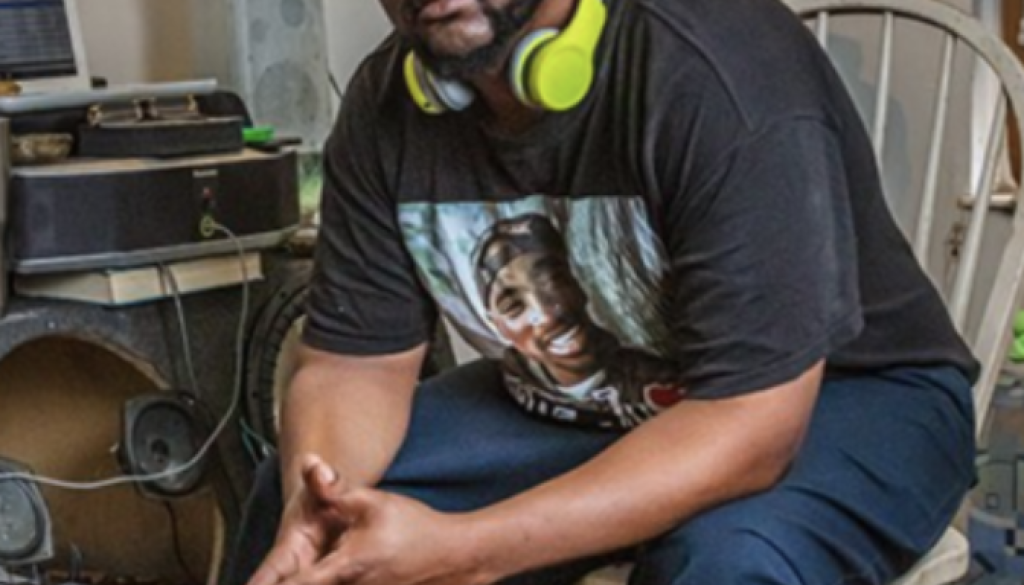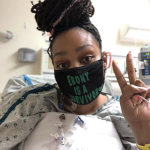In chapter 2 of this pandemic saga, Steven Jones, beset with health issues, struggles to find his place in a teetering economy.

This story first appeared in stlmag.com, with support provided through a grant from the Buckingham Strategic Wealth Pillar Grant Program. Additional support provided by the St. Louis Press Club.
By Jeannette Cooperman
Before Ferguson Beyond Ferguson
A nonprofit racial equity storytelling project
St. Louis native Steven Jones started life idealistic, curious, in love with science, his mother working for the federal government.
Growing up meant steady disenchantment. In his eyes, science just pretended to have absolute truth. He read accounts of the U.S. funding the Nicaraguan Contras, then read of claims that Contras brought crack cocaine into Black neighborhoods, tearing them apart. “I can’t trust Uncle Sam,” he murmurs. “All he’s gonna do is use us like a corner boy.”
In 2012, Jones was working full time as a grill master at Red Lobster when a massive epileptic seizure zapped his memory and strength. He’s been struggling ever since: He can’t get a driver’s license because of the seizures, which medication is only now controlling, and he can’t do anything too strenuous, or they’ll start up again.
In February, he finally found a job that paid $18 an hour—then lost it with the lockdown.
Relentlessly inquisitive, his conversation peppered with interesting facts, Jones would love to do independent research, maybe as a private investigator. But the next time we talk, after combing daily through “Indeed and LinkedIn and all those,” he says glumly, “right now it’s looking like McDonald’s is going to be my best bet.”
By mid-June, he hasn’t found that, either. “McDonald’s should not hire 17-year-olds,” he announces. “The only thing they worry about is their iPhone bill.” Name-checking a favorite author, Thomas Paine, he adds, “You would expect there to be common sense.”
The same holds for the job search process: “When you fill out a job application, they tell you they don’t care about your age, your gender, your race—but they still ask you, don’t they?” He’s taken to checking “Caucasian” on application forms: “I found out how much easier it is to get a job that way. And my mama gave me the whitest name on the planet: Steven Michael Jones.” By the time a prospective employer notices his race, he says, they will have seen his résumé. “I have to get myself in the door.”
The entire country is losing its self-respect, he says: “We are supposed to be the toughest motherf—kers on the planet, but we have become big babies who don’t want to work. We have become the court jester of the planet—we’re Ronald McDonald. We ate so many Big Macs that we are now the clown ourselves.”
Jones worries about his daughters catching COVID-19: “They are still in Never-Never Land,” he sighs. “I tell them everybody’s going to turn into zombies if they don’t stay clean. They love that zombie show, so they get that.”
Because one of his epilepsy medications weakens his immune system, he was supposed to avoid germs even before the pandemic. “The last thing I need is to be on a ventilator,” he says. Still, when I ask whether he thinks President Donald Trump understands COVID-19, he says, “I don’t think we do. It’s worse than having a big room full of conspiracy theorists. No source is credible.” He sighs. “Maybe nature is trying to balance out the fact that we want to crowd ourselves in small cities. I hate bein’ in the city. I’d rather be in the woods, getting bit by a mosquito. At least there I know what I’ve got coming.”
Urban poverty takes a toll, Jones says: You get too used to your circumstances. “You see it when you leave your environment and go somewhere else and everybody’s, like, ‘Why do you act like that?’ My cousins stayed in North County, by Bermuda, and they kept their bikes outside! When I was 3 or 4, I had those little Fisher-Price cars, two of them stolen the same week. They are going to take your tires, they are going to take your spokes, they are going to take the little ribbons off your handlebars.”
The fear of crime coexists with fear of the police. “If you patrol 63106, you should live in 63106,” he says. “You are more likely to see me shopping or filling my car with gas, and you are going to see me as a person. Your pride is now gone; you are a human being like I am. So, are you scared to see me now?” He hurries to add, “Don’t get me wrong. I pull up on a car and there are eight guys inside, I’ve had that fear, too. But I’d pull up right beside the car, hand-gesture for them to roll down the window: ‘How are y’all doing? Do I need to search the car? ’Cause you know I will.’ You can look at a person and see if they look high. I’d say, ‘I’m pretty sure you have someone at home you care about, so can we make this legal?’”
The only time Jones has lived in a neighborhood that wasn’t segregated by race was when he lived in Texas. “The racism is different in the South,” he observes. “They are blatantly open, but it’s comfortable, if that makes sense, because you let me know from the beginning you don’t deal with me. ‘Don’t cause no trouble; we don’t have no problem.’ See, I can deal with that. But that sneaky little lowdown thing where I’m at a department store and somebody is following me around because I’m shopping?”
I ask how he thinks his life would be different if he were white. “I could leave a window open,” he answers instantly. “I could take my kids to the pool or the park without somebody saying, ‘Hey, there’s some Black person at the park.’”
We talk next about women—and the service dog he had for a time, to alert him to seizures, which offered a far less complicated loyalty. “I loved that dog so much,” he mutters. “Couldn’t afford to keep her.”
He can’t afford to stay in a relationship either, he says: “Already, as Black men, we have been null and void in our community. There is no need for a Black man in the community, as far as we can tell. Women can make $15 an hour just answering the phone in a law firm, while I’m working my ass off in a factory for $10.” He’s been single since 2013: “Last thing I need is a woman to look me down ’cause I’m disabled. Women feel like because they can hunt for themselves, men are no longer necessary. And men—till we’re 35, we’re just big-ass kids. Then the hormones switch over and it’s ‘Oh, we might have an empire to build.’ I’d have been 10 times better if I’d started trying to build my empire at age 13.”
What about all those decent, moral, churchgoing women, I ask, feeling a sudden impulse to fix him up.
“They’re in love with their pastor! They’re in love with the power their pastor has over the people. And he’s the spiritual leader. And he’s in a suit!” Jones chuckles. “And to make sure he’s the only one, all the deacons are heavyset.”
When I ask whether he misses anything about being in a relationship, he answers without hesitation: “Intimacy. I really do. I miss having someone that I feel like I can be me with. But then again, we are in 2020, where you are different on Instagram, Facebook, Snapchat… Everyone wears a mask.”
Jones has an in-home studio and a record label, HatzOff, for which he designed a cool ultra-contemporary watch-face logo. “It’s just in my idle time, I just kind of draw abstract art,” he says, the fire of his political opinions cooling into uncertainty. “I’m not an artist.”
I say I bet his daughters think he is. “They’re the ones,” he corrects me. “We go to the art studio on 12th and Geyer all the time. I’ve been finding free stuff to do with them, because I’m not paying $20 to be on the back of a horse or go on a merry-go-round that costs the same as Six Flags. My girls like the Missouri Botanical Garden—they don’t even have to go inside; they can just look at the flowers from the outside. They are amazed by how things change, how even the trees are different between North and South St. Louis. I teach them about the stuff that never changes. Not the stuff we do—we change like the wind. But some stuff never changes, and that’s the stuff you have to pay attention to. Some music is timeless. Some art is timeless. Memories. Anything you can catch in a moment, ’cause that’s really what everything is, moments.”
Last summer, Jones volunteered with Urban Strategies, a nonprofit focused on neighborhood planning and revitalization, in part because his eldest daughter was living with him: “I wanted her to see me doing something more positive. It’s a neighborhood where people are scared of everything.”
His work won him a Community Team Leadership award. Now, he says, “I think I need to start being part of politics and getting stuff moving. This stuff has got to change. But we’ve got to be the ones to change it.”




